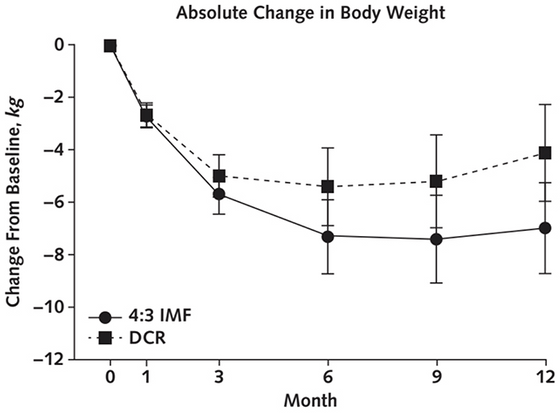Research shows that restricting calories only 3 days a week is more effective for weight loss than restricting calories every day

Many people have started restricting their calories to get a healthier and slimmer figure, but the hassle of counting calories and suppressing appetite every day is too much, and they give up after three days. A study was conducted in which overweight Americans were asked to try a '4:3 intermittent fasting' diet, in which they restricted their calorie intake for only three days a week and ate normally for the remaining four days. The study reported that this was a more effective way to lose weight than restricting calories a little at a time every day.
The Effect of 4:3 Intermittent Fasting on Weight Loss at 12 Months: A Randomized Clinical Trial: Annals of Internal Medicine: Vol 0, No 0
4:3 Intermittent Fasting Outperforms Daily Calorie Restriction in Weight-Loss Study
https://news.cuanschutz.edu/news-stories/intermittent-fasting-outperforms-calorie-counting-in-weight-loss-study
One Simple Strategy For Weight Loss Outperforms Daily Dieting, Study Says : ScienceAlert
https://www.sciencealert.com/one-simple-strategy-for-weight-loss-outperforms-daily-dieting-study-says
According to Victoria Catenacci, an endocrinologist at the University of Colorado, there are two main types of intermittent fasting for weight loss. One is to restrict the time period during the day when you eat, and the most common is the '16:8 plan,' in which you eat only during the eight hours of the day and fast for the remaining 16 hours.
The other is to significantly restrict calorie intake on certain days of the week, such as the '5:2 plan' for two days a week or the '4:3 plan' for three days a week. However, past research has shown that fasting only two days a week is not very effective, and that alternate-day fasting schedules are too strict to be sustained for long periods of time. Therefore, this study adopted the '4:3 plan,' which is expected to be the best ratio of days with and without calorie restriction.

The study participants were 165 adults recruited from Denver, Colorado, and the surrounding area, aged 18-60, with
The research team first divided participants into the 'IMF group,' which restricted calorie intake by 80% three days a week, and the 'DCR group,' which restricted daily calorie intake by 34%. The weekly calorie restriction in both groups was adjusted to be equal, and the IMF group was allowed to flexibly decide on the days they fasted according to their own convenience.
After 12 months, the research team tracked the participants' weight and found that the DCR group lost an average of 4.8 kg, while the IMF group lost an average of 7.7 kg, a difference of about 3 kg.

In addition, the percentage of people who dropped out was 30% in the DCR group, but only 19% in the IMF group, meaning that more than 80% of people were able to continue with the calorie restriction for a year. The research team believes that this high success rate is the reason why the 4:3 intermittent fasting method was so effective at reducing weight.
The experiment contents and results are summarized in the table below.
| DCR Group | IMF Group | |
|---|---|---|
| Calorie restriction day | every day | 3 days a week (flexible) |
| No calorie restriction days | none | 4 days a week (healthy eating recommended) |
| Calorie restriction | 34% | 80% |
| Calorie intake on restricted days (approximate) | Women: 1300-1800kcal Men: 1500-2000kcal | Women: 400-600kcal Men: 500-700 kcal |
| Average weight loss rate | 5% | 7.6% |
| Percentage of people who successfully lost 5% or more weight | 47% | 58% |
| Dropout rate | 30% | 19% |
According to the research team, the IMF group also showed greater improvements in blood pressure, total cholesterol, and blood sugar levels than the DCR group.
'The key message for me is that this is an evidence-based dietary strategy, and it works well, especially for people who have tried and struggled to restrict their daily calories,' Catenacci said.
Related Posts:
in Science, Posted by log1l_ks







